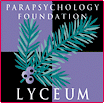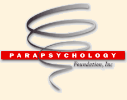 |
 |
| Click here for the French version of this blog
PF Lyceum Blog #2, October 6th, 2005 by Carlos S. Alvarado, Ph.D. When I refer to parapsychology as a profession I do not mean those that teach the development of psychic abilities nor those that practice as psychics, mediums, or healers. Parapsychology is a research field in which its practitioners devote their time to learning about their phenomena through scientific investigations. (For suggested readings see the PF Bibliography, Parapsychology as a Science and the PF Bbliography, Aspects of Parapsychology as a Profession.) The emphasis on science is what characterizes the field. One prominent parapsychologist has summarized this situation as follows: “Parapsychology is defined as the application of scientific methods to the study of certain kinds of anomalous phenomena, which means that, first and foremost, parapsychologists are scientists. Thus, if you say you want to become a parapsychologist, you are also saying that you want to become a scientist”. (This quote is from John Palmer's article “Education in Parapsychology”. Click here to read the article. For suggested readings about research approaches see the PF Bibliography Research Methods and Approaches Used in Parapsycyhology, or go to our on-line store to find our pamphlet A Brief Manual for Work in Parapsychology.) The research that characterizes the field is focused on laboratory experiments of extrasensory perception and, to a lesser extent, of psychokinesis. (For a bibliography on the variety of laboratory experiences, click here.) But there is also some research taking place outside of the laboratory. Among these are interview studies, including those conducted with individuals who have had apparitional experiences, and with children who claim to remember previous lives; field studies of hauntings and poltergeists; and survey studies of such phenomena as out-of-body experiences, among other things. (For an abstract of Rhea White's review of additional approaches to the study of spontaneous experiences, click here.) Using these approaches, parapsychologists attempt to do several things. One of them is to continue to provide evidence for the existence of the phenomenon they study. They also try to learn about their phenomena by identifying their features and the conditions and forms in which they manifest. In addition, parapsychologists conduct research to see if and how the phenomena relate to such variables as personality characteristics, altered states of consciousness, and physical and psychophysiological variables, among other areas of research. You may be able to get an idea of the career of many parapsychologists by checking their biographies and list of publications, some of which appear in the "Member Index" of the Parapsychological Association. Other articles reporting the research done by specific individuals can also be found online. (Click here to find a list.) There is also a biographical literature that may be useful so as to chart parapsychological careers. (Click here to find a list.) This literature will show you the variety of phenomena studied and the motivations and hopes of researchers and scholars, some of which may be similar to yours. However, be also aware that one does not need to be a scientist to be involved in parapsychology professionally, nor does one have to conduct scientific studies of psychic phenomena to “be” in the field or to contribute to it. Let me give you an example from my own career. While I have conducted research on such phenomena as out-of-body experiences, around 30% of my published articles have been reviews of the old psychical research literature, or of other topics related to this literature. It has been my hope to inform my colleagues of the richness of our literature. The late Dr. Robert L. Morris was the Koestler Professor of Parapsychology at the University of Edinburgh from 1985 to 2004. Dr. Morris, himself a researcher, devoted many years of his career to educational efforts. He graduated many students with doctoral degrees in psychology (not in parapsychology), who conducted parapsychological research for their dissertations, and then went on to conduct research and teach parapsychology themselves. Dr. Morris's life provides an excellent example of a career in parapsychology that, at least in its last decades, centered on teaching and mentoring students, rather than on research. Similarly, others have made important bibliographical, clinical, editorial, conceptual, historical, statistical, philosophical, and theoretical contributions to the field that did not involve direct investigation of the phenomena. You may also contribute to the field by disseminating its research results to the general public. The popularization of science is an important contribution to public education. Even though people have had careers in parapsychology, the newcomer to the field should be aware of the problems of being a parapsychologist. When we talk about parapsychology as a profession we need to be clear about the problems of this field. One is the very small size of the field (Scroll down the page to the section called "Personnel in Parapsychology" in my 2003 PA presidential address.) As Dr. Charles T. Tart said: ... scientific parapsychology is a miniscule field, with only a few dozen people in the entire world working in it, most only part time ... I must warn you that chances of a decent job, if you can find the training, are small indeed.(Click here for the article from which the quote was taken.) The small size of the field is reflected in the number of members of the professional association of parapsychologists. (Click here for more information on the Parapsychological Association.) The newcomer to the field, usually a young person who has little experience in academia, research and professional issues at large, also needs to be aware that in many quarters there is very little prestige in being a parapsychologist, and that there are many problems you may encounter if you become identified with this field. Among them are outright hostility, lack of funding, and unemployment. To read my comments on "How Does It Feel to Be A Parapsychologist", click here, and scroll down the page. Anthropologist of science, Dr. David J. Hess, also wrote an article on the experience of parapsychologists in academia. The article is available by clicking here. However, there is no question that this is an exciting profession that deals with important and fascinating topics, and that parapsychologists have a right to be proud of their intellectual tradition and contributions (Click here for my article on "Parapsychologists Contributions to Knowledge".) Furthermore, the work of parapsychologists has many implications for the study of human behavior, a topic that will be the subject of a future blog. Later discussions will focus on what can you need to do to get into parapsychology. |
 |

|
 www. parapsychology. org |
||